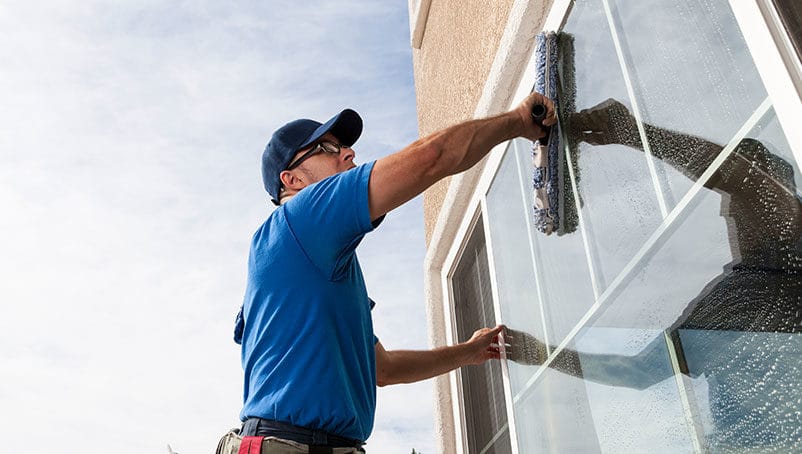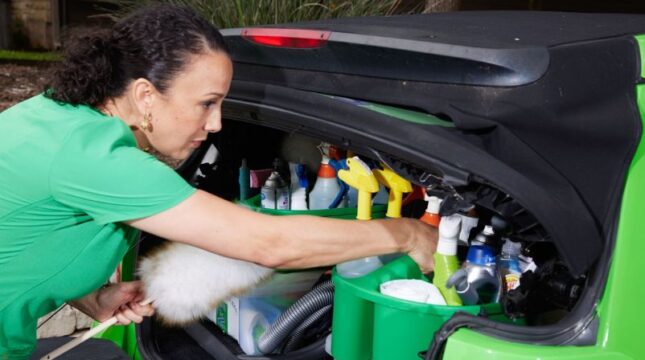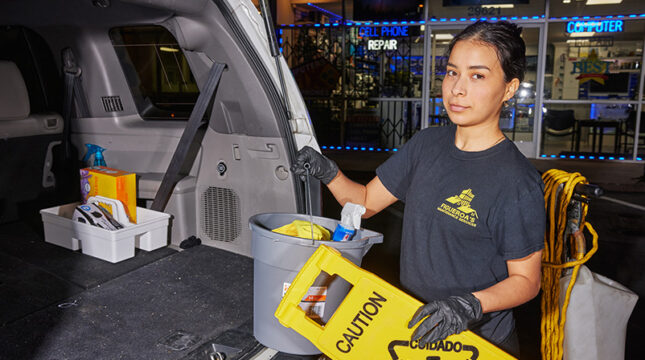How much does it cost to start a window cleaning business?
One of the biggest benefits of window cleaning is that you can get started with minimal upfront investment — often between $500 and $5,000, depending on your gear and goals. If you’re starting a small residential window cleaning business, you can stick to the lower end of the range. If you plan to offer high-rise or commercial window cleaning, expect to spend more on safety equipment, ladders and transportation.
According to Scott Schrader, Chief Marketing Officer of CottageCare, “Basic cleaning tools such as squeegees, scrapers, buckets and safety equipment will cost approximately $500 to $1,500. The larger setups with water-fed poles, ladders and transportation will increase startup costs above $5,000 often.”
Common startup expenses include
- Business registration and licenses: Filing fees, DBA, sales tax registration
- Window cleaning equipment: Squeegees, scrubbers, poles, buckets, cleaning solution
- Safety gear: Harnesses, gloves, non-slip boots, ladder stabilizers
- Transportation: A van or vehicle large enough to carry your equipment
- Business insurance: Can help protect against property damage, accidents and theft
- Marketing and branding: Website, flyers, local ads, logo design, business cards
Can I start a window cleaning business with no money?
If you’re starting a window washing business on a tight budget, it’s possible to launch with just a few basic tools and a lot of hustle.. Many window cleaners begin with just basic supplies and grow from there.
Here are a few low-cost ways to get started:
- Use household cleaners and towels for early jobs
- Offer discounted services to friends in exchange for referrals
- Post flyers in your neighborhood or at local businesses
- List your services on free sites like Craigslist or Nextdoor
- Borrow or rent tools until you can afford your own
Focus on building a few local clients, reinvest your early earnings and upgrade as you go.
How to fund your window cleaning business
Need help covering window cleaning startup costs? Here are a few ways to fund your business:
- Personal savings: Start small and reinvest early profits.
- Friends and family: A fast, low-interest option.
- Small business loans or grants: Check with your local Small Business Administration (SBA) office.
- Business credit card: Good for tools or early marketing costs.
- SCORE/Small Business Development Center: Free resources to help build your plan and find funding.
You don’t need a big loan to launch a window cleaning company — just enough to get your first few jobs and grow from there.
How to start a window cleaning business in eight steps
You don’t need to work on high-rise buildings to run a successful window cleaning business. Most communities have plenty of opportunities to get started.
1. Do market research
Before you invest in equipment or permits, take time to research your local market. What types of window cleaning services are in demand — residential, storefront or commercial? What are your competitors charging? What are customers saying in online reviews? Understanding your area’s needs can help you offer the right services at the right price.
If you live in a region with cold winters or lots of rain, keep in mind that your business may be seasonal. Planning for slower months can help you stay financially steady.
2. Create a business plan for your window cleaning business
A small business plan helps you organize your thoughts on your goals. Your plan should include a target market (who your ideal customer is), a list of your equipment and operational costs, short- and long-term income goals, an evaluation of competitors, local project opportunities and more.
Later, if you want to grow your business, a more detailed and compelling new business plan will be essential. Most banks and lenders will want to see your game plan before funding a business.
3. Map out your business budget
Knowing your numbers helps you make smarter decisions as you grow. Start by estimating your monthly costs — cleaning supplies, fuel, marketing and insurance. Then factor in any one-time startup purchases such as ladders, extension poles and safety gear.
Next, set income goals. How many clients will you need each week to break even or hit your first profit milestone? A clear view of your expenses and expected revenue can help you price your services competitively and avoid overspending.
Budgeting doesn’t have to be complicated — a simple spreadsheet is enough to get started.
4. Establish your business — officially
You may need to complete some paperwork to set up your window cleaning business properly.
First, apply for a free Employer Identification Number (EIN) from the IRS. This allows you to receive payment from a business without sharing your personal Social Security number. It also gives your business an official identity for tax purposes.
Next, consider your business structure: do you want to operate your business as a sole proprietorship or a limited liability corporation (LLC)? You may want to consult with a lawyer to understand what’s right for your business.
- Sole proprietorship: This structure is simple and inexpensive to set up. But, your personal assets (your vehicle, house, and savings accounts) aren’t protected if your business gets sued.
- LLC: This structure requires slightly more paperwork and fees, but offers more protection for your personal finances.
Finally, check your city and state’s rules to see if you need a cleaning business license or special permit. Generally, there are no occupational window washer licenses or certificates you’ll need when starting your business. However, most window cleaning businesses need to register with the state and pay applicable taxes.
In some cities, you may also need permits for water use or wastewater runoff — especially if you use water-fed pole systems on large buildings or work near storm drains. Additional safety regulations or local permits might apply if you’re working on tall buildings or using lifts.
5. Open a business bank account
A business bank keeps your personal and business finances separate. It can help protect your personal assets in case of a lawsuit, make bookkeeping and taxes easier, and even build credit for your business.
Look for an account with low fees, helpful features, and solid support — whether from a local bank or an online provider.
When you apply, the U.S. Small Business Administration recommends having:
- Your EIN (or Social Security number for sole proprietors)
- Business formation documents
- Ownership agreements (if applicable)
- Business license or registration
Having a dedicated account also helps you look more professional when invoicing clients or applying for funding.
6. Get business insurance
Business insurance can help protect your window cleaning business financially if something goes wrong. Even when you follow safety protocols, accidents, injuries and damage can still happen — and some clients may ask for proof of coverage before hiring you.
Here are the most common types of insurance to consider:
General Liability insurance
General liability insurance helps protect you from costs related to damage to someone’s property and accidents that hurt someone other than an employee. Many residential and commercial clients require you to have this kind of insurance.
For example, say you’re cleaning windows on a client’s property, and your ladder accidentally tips over and crashes through their glass door. General liability helps cover their property damage if the client sues you.
Workers’ Compensation insurance
Workers’ compensation insurance is usually required by law if you have employees. This policy can help cover workplace injuries, related medical expenses and lost wages if your employees get hurt on the job.
Say one of your employees falls from a ladder and breaks their arm. They’re unable to work for six weeks and require surgery and physical therapy. Workers’ comp helps cover the loss of income for six weeks and any medical treatment they need.
Tools and equipment insurance
Tools and equipment insurance coverage helps pay for the replacement and repair costs related to the theft or damage of your tools. For instance, say someone breaks into your van overnight and steals several expensive squeegees, extension poles and water-fed pole systems. This coverage can help pay to replace it.
Errors and Omissions insurance (E&O)
Errors and omissions insurance helps you defend yourself if you’re accused of negligence or providing advice that causes someone to lose money. This coverage is sometimes called professional liability insurance.
Commercial Auto insurance
Commercial auto insurance can help pay to repair or replace gear that’s stolen, lost or damaged on the job or in transit. If you use your own vehicle to drive to job sites, personal auto insurance may not always cover business-related activities.
7. Buy equipment and supplies
Starting a window cleaning business means investing in tools, safety gear, and transportation. Here are some of the supplies you’ll likely need:
- Squeegees
- Scrubbers or T-bars
- Bucket
- Cleaning solution
- Microfiber cloths
- Extension poles (for high windows)
- Safety harnesses (especially for multi-story work)
- Non-slip shoes or boots
- Gloves
- A work vehicle
Think about what kind of services you’ll offer. Will you focus on storefronts, residential homes, or high-rise buildings? Will you provide other services like gutter cleaning, solar panel cleaning, pressure washing or screen repair? If so, what kind of equipment is needed for those services? You can always start small and upgrade your gear as you grow.
8. Set up your home base
Even if you’re running a one-person operation, having a dedicated space can help your business run more smoothly. Here’s what to think about:
- Storage space: Use your garage, shed or a corner of your home to safely store ladders, buckets and cleaning supplies.
- Home office setup: Set aside a desk or workspace to schedule jobs, send invoices and track expenses.
- Zoning and local rules: Check city or HOA regulations to ensure you can run a business from home.
- Vehicle access: Make sure your parking area is easy to access and has enough space to load and unload your tools.
A simple, well-organized setup helps you stay efficient — and gives your business a more professional feel from the start.
Marketing your window cleaning business
You don’t need a big marketing budget to find your first clients. Start small, stay consistent and focus on building trust in your local area. Here are a few practical ways to get your name out there.
Set up a simple website
Your website doesn’t have to be fancy — just helpful and easy to navigate. Make sure it includes your services, pricing, contact information and photos of your work. Adding customer testimonials or before-and-after shots can build trust. Optimizing your site for local search (like “window cleaning in [your city]”) helps potential clients find you more easily.
Claim your business listings and social profiles
Don’t forget about the digital side of promotions and marketing. Claim your business name with Google My Business or Yelp, which allows your past customers to leave reviews to help you build a good reputation. You may also want to establish a social media presence to share updates, respond to inquiries or promote seasonal discounts, but this is optional initially.
Network in your local community
Word of mouth still works. Let friends and family know you’re open for business. It’s also helpful to let anyone who manages or owns a local business know about your new window washing business. You can hand out business cards, stop by local storefronts or office buildings or introduce yourself to real estate agents and property managers. Even a short conversation can turn into a job — or a referral down the line.






